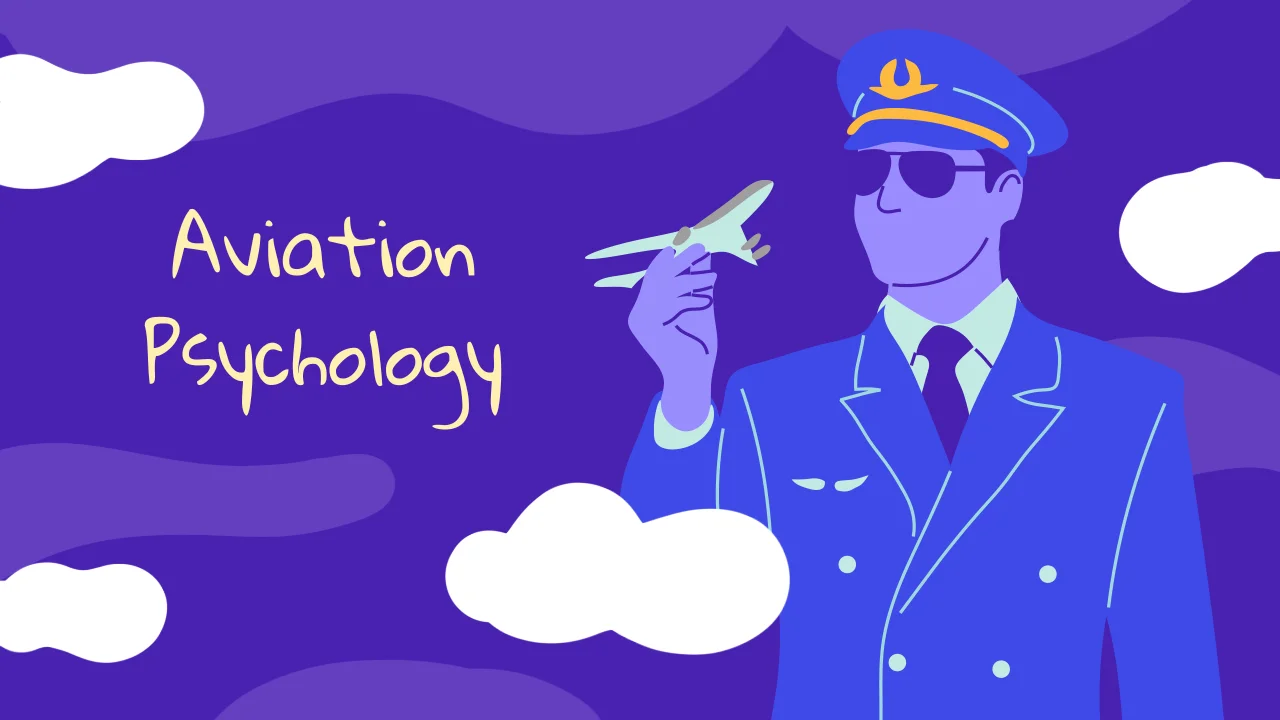
Start feeling better today!
Connect with your therapist today and take control of your life like our 850.000 happy clients.
Get StartedAviation Psychology
What is Aviation Psychology? What do aviation psychologists do? How does this sector relate to other areas of psychology? How important is the mental health of aviation personnel? Let's take a closer look at these questions and more.
What is Aviation Psychology?
Aviation psychology is a subfield of psychology that deals with the application of principles and techniques from psychology to specific situations and problems in the aviation industry1. It focuses on how to use different psychological skills and points of view to make air travel safe, fast, and comfortable2.
Aviation psychology, which was previously associated with clinical and organizational psychology, has since expanded to include the psychological processes of passengers, aviation personnel, and crew in general2.
For many years, flight physicians carried out studies in this field, but in the following years, psychologists who received training to become aviation psychologists started to work in this sector. Today, aviation and space physicians take active roles in the selection of flight personnel, health examinations, and psychiatric evaluation processes.
Aviation and space psychologists, on the other hand, take an active role in the following areas:1, 3, 4.
- Flight stress and fear
- Post-accident psychological support
- Team resource management
- Psychomotor assessment
- Peer support programs
The Challenges of Flying
Humans have not evolved to be able to fly. In order for us to have a comfortable and safe flight experience, our physical and mental structures have evolved in ways that make it hard for us to fly2.
Commercial aircraft typically cruise at altitudes greater than 10,000 miles. Our bodies are not suitable for being at such heights with such low atmospheric pressure. At cruising altitude, the partial pressure of oxygen in the cabin air is 25–30% lower than at sea level.
Aviation Passengers
Long-term flying, in particular, has physiological and psychological consequences for passengers.These are as follows:
- Ear congestion due to high pressure
- Insomnia and fatigue due to jet-lag
- Motion sickness
- Oxygen and water loss
- Isolation from the world
Air travel can bring us into close quarters with strangers in a confined space. The interaction of passengers and crew is also a research topic in aviation psychology2.
Flight Personnel
From the point of view of the flight crew, there are different problems besides the above items. The following are the issues:
- Shift work
- Handling anxious and aggressive passengers
- Commercial pressure
There can be great differences in stimulation and stress at different stages in the flight process. It is critical for flight safety that there are no problems related to decision-making, perception, or attention in the crew.
What Do Aviation Psychologists Do?
Aviation psychologists generally strive to improve conditions in the aviation industry. They make use of theories about human emotions, thoughts, and behaviors to provide psychological support to pilots and aircraft crews, as well as to each individual working in the aviation field, to help them solve their problems and manage their stress and anxiety.
Negative situations experienced during the flight may lead to poor performance for those working in the aviation industry, and this may be life-threatening for the passengers. Precisely for this reason, a psychologist working in the aviation field is primarily concerned with recruiting aviation personnel who are of sound mind and able to operate in the safest and most convenient way5.
The job description of an aviation psychologist includes the following:
- Selection of all aviation personnel including pilots
- Handling problems that may occur in the aviation industry
- Evaluation and counseling of flight crew members
- Understanding the attitudes and behaviors of passengers
- Providing psychological support
- Helping with communication among crew members
It covers a wide range of topics, including improving team communication and looking into passenger interactions.
The performance of each individual working in the aviation industry also affects flight performance. Hence, it is among the duties of aviation psychologists to carefully define all the jobs in the aviation industry, to select the people responsible for these jobs, to train the people responsible for these jobs, to monitor the performance of the employees, and to ensure team harmony and communication.
In general, aviation psychology aims to evaluate and make inferences based on the general principles of psychology and by understanding the behavior of employees in the aviation industry5.
Aviation Psychologists Focus Groups
Borr and colleagues, in their study in 2020, determined the groups that aviation psychologists focus on. These groups can be listed as follows6:

- Passenger and their family members
- Pilots
- Flight instructors and observers
- Cabin attendants
- Air traffic controllers
- Air traffic security personnel
- Engineers in charge of aircraft maintenance
- Meteorologists
- Ramp and dispatch teams
- Inspectors and auditors
- Airport staff
- Aircraft manufacturers and designers
Other Subfields of Psychology and Aviation Psychology
Psychology, with its many subfields, has continued to contribute to the aviation psychology subfield, which has grown since the First World War and continues to this day. The fields that make the most contributions to the field of aviation psychology are5:
- Industrial and organizational psychology
- Social psychology
- Health psychology
- Intercultural psychology
- Clinical psychology
Each of these areas deals with a different set of psychological issues, processes, or problems, but they all share the goal of explaining human thoughts and behaviors. Aviation psychology, which arose as a result of the contributions of many sub-fields of psychology combined with the needs of the aviation industry, provided psychologists with an important new field to work in5.
Clinical Psychology and Aviation Psychology
In the aviation industry, the most basic task of a pilot is to safely fly the plane to its destination. Aside from the pilot's current professional competencies, the pilot's mental health should be constantly monitored throughout the process, and psychological support should be provided to the pilot as needed5.
Clinical psychology is conducting research to better understand the psychological health of aviation industry employees based on psychopathology and personality disorders. For these reasons, airlines conduct health checks on pilots on a regular basis with medical teams that include clinical psychologists. Aviation psychologists look for any health issues that may be preventing pilots from flying safely5.
In the literature, we can see that research has been done on personality structure and how stress caused by personality structure can affect how well pilots in the aviation industry fly. These studies show that there are also some links between personality and safe flight5, 7, 8. For more information about personality disorders, you can read our article Personality Disorders.
The aviation industry hit a turning point in 2015 with the crash of "Germanwings Flight 9525." After this accident, a lot of psychologists started looking into how mental disorders affect people in the aviation industry. Because of this, the most significant factor to look for in a pilot, besides their professional skills and job fit, is whether or not they have a pathological personality disorder5, 6.

Personality Disorders and Examples from the Aviation Industry
If the pilot has paranoid personality disorder, they may think that other flight crew members are talking behind their back and become defensive.
A pilot with narcissistic personality disorder may think that they have more knowledge than experienced pilots and may argue about it.
A co-pilot with dependent personality disorder might be afraid to take charge when it's needed because they always think they're not good enough. When the co-pilot has to make a decision instead of the pilot, they may hesitate and end up making a bad decision.
While many of these issues have a negative impact on the flight process, they also cause plenty of security issues. All aviation sector employees, particularly pilots, should have their psychological health carefully assessed5.
One of the most significant contributions of clinical psychologists and aviation psychologists to this industry is to assist pilots and cabin crew members in more easily coping with the challenges of the job. Long flight hours, shift work, stress, feelings of burnout, insomnia, attention problems, and other issues are common in this industry. Such issues are identified in advance with the assistance of psychologists who work in this field. As a result, making the necessary interventions becomes less difficult5.
Sources
- Nazım, A. T. A. Aviation Psychiatry and Psychology in Turkey. Mersin University Faculty of Medicine Lokman Hekim Journal of Medical History and Folkloric Medicine, 11(1), 160-172.
- Bor, R., Eriksen, C., Oakes, M., & Baum, P. (2013). Aviation psychology. Principles and practice of travel medicine, 315-327.
- Çetinüç M. Flight psychologists. Bulletin of Aviation Medicine 2018; 32:1022-3 Çetinguç M. Aviation psychology course was opened. Aviation Medicine Bulletin 2017; 31:966
- Birsel, M. Aviation Psychology: Constructs, Research and Practices. Bor, R., Eriksen, C., Hubbard, T. P. and King, R. (2020). Pilot Selection Psychological Principles and Practice. New York: CRC Press. Taylor & Francis Group.
- Wilson, K. (2013). Development of a Pilot Selection System for a Midwestern University Aviation Program. Master Thesis, Minnesota State University, Master of Arts, Mankato.
- Yamamoto, S., Shibuya, M., Izumi, H., Shih, Y. C., Lin, C. J., and Lim, H. K. (2015). New Ergonomics Perspective: Selected papers of the 10th Pan-Pacific Conference on Ergonomics, Tokyo, Japan, 25-28 August 2014. CRC Press.





